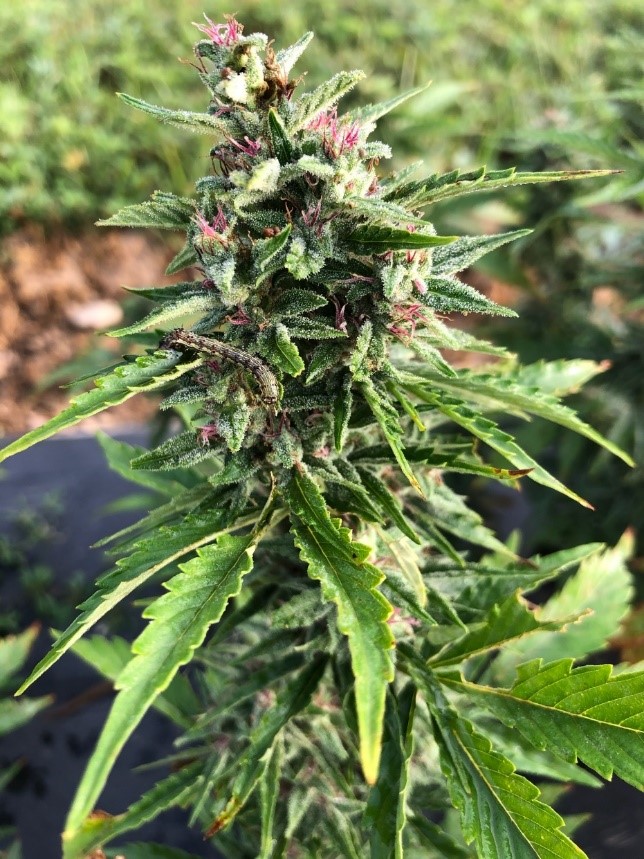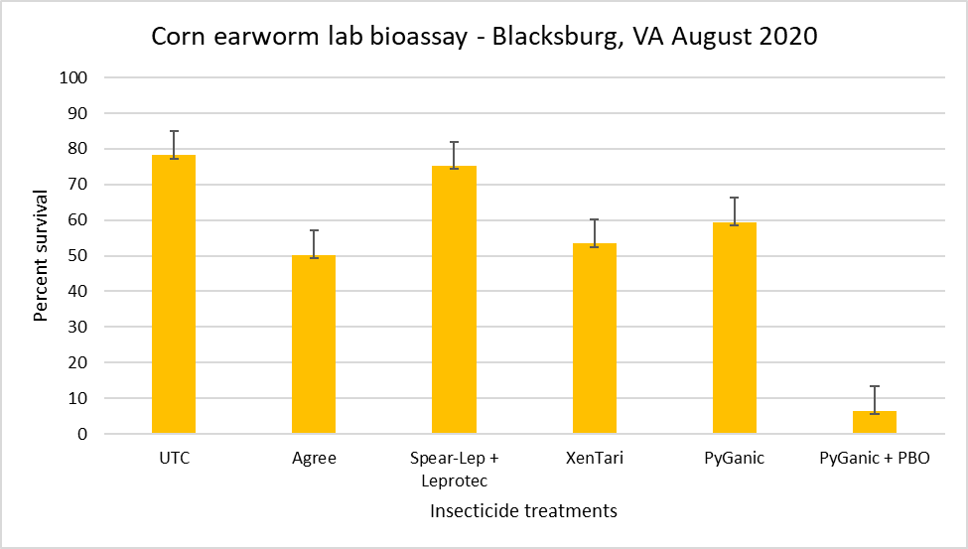This article was co-authored by Virginia Tech Entomology Ph.D. student, Kadie Britt.
Here are the corn earworm moth catch numbers from a handful of pheromone traps that we have set up in hemp fields and one sweet corn field around Blacksburg, VA. Trap catch appeared to peak around mid-August with moths emerging from cornfields and has subsided a little toward the end of August. Crops such as soybeans, hemp, tomatoes, and sweet corn are still at risk to this important pest.

Corn earworm (CEW) is the insect pest of greatest concern to hemp grown outdoors in Virginia and other states. For more information about this pest’s biology and behavior in hemp, see this factsheet: https://www.pubs.ext.vt.edu/content/dam/pubs_ext_vt_edu/ENTO/ento-328/ENTO-328.pdf.
We have already started to see worms feeding on hemp throughout Virginia. CEW feeding on hemp causes mechanical damage to buds, allowing environmental pathogens to enter crop material, ultimately leading to bud rot. Bud rot is visible and present in hemp crops right now but is not prevalent just yet. Managing populations early on will be key to reducing crop injury this season.

Strict regulations on pesticide applications to hemp prevent the use of many available insecticides. We have conducted a laboratory experiment to evaluate the efficacy of some products that are currently allowed for use in hemp in Virginia as well as Pyganic, which is not labeled on hemp, but is a widely used organic insecticide.
Treatments included in the August 19, 2020 bioassay included:
- Untreated control (UTC): water
- Agree: Bacillus thuringiensis subspecies aizawai strain GC-91
- Spear-Lep + Leprotec: GS-omega/kappa-Hxtx-Hv1a + Bacillus thuringiensis variety kurstaki
- XenTari: Bacillus thuringiensis subspecies aizawai strain ABTS-1857
- PyGanic: Pyrethrins
- PyGanic + PBO (insecticide synergist): Pyrethrins + Piperonyl butoxide
To conduct this bioassay, corn earworm larvae (3rd to 5th instars) were collected from untreated sweet corn grown at Kentland Research Farm in Whitethorne, VA. Untreated hemp seed heads were collected from grain hemp, variety ‘Joey’, grown at the Urban Horticulture Center farm in Blacksburg, VA. Seed heads were dipped in spray tank concentrations of each insecticide at the high labeled rate and placed into 1 oz. diet cups. Larval corn earworms were placed directly on top of treated material. Mortality was evaluated at 1, 2, 3, and 4 days after the experiment was set up (Figure 3). PyGanic + PBO provided significantly greater efficacy against CEW than all other products tested with only 6.5% of worms surviving after 4 days. The addition of the synergist is needed for effective control with Pyganic due to pyrethroid resistance development in this pest. Unfortunately, Pyganic is not currently labeled for use on hemp in Virginia. Agree, XenTari, and PyGanic without PBO all performed similarly with 50.3%, 53.5%, and 59.9% of worms surviving after 4 days, respectively.

Looking ahead this season, insecticide research trials in CBD hemp will be conducted in Blackstone with all of the aforementioned products plus many more. We will continue doing lab bioassays with CEW and other insecticides that are allowed for use in hemp at this time. Results will be shared as they become available.
